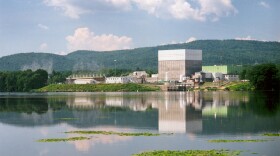The Vermont Nuclear Decommissioning Citizens Advisory Panel’s Federal Nuclear Waste Policy Committee has been meeting to assess federal policies and review potential nuclear waste storage methods. During its meeting this week the panel heard from a company that is proposing to use borehole technology to store such waste.
In December 2021, the Department of Energy issued a Request for Information to identify locations for interim storage of spent nuclear fuel. The Vermont committee is currently reviewing nuclear waste policies, legislative actions and potential options for storage of waste from the decommissioned Vermont Nuclear Power Plant.
At Monday afternoon’s meeting a California start-up outlined plans to use existing borehole technology to place the waste deep underground.
Deep Isolation Vice President of Global Affairs and Policy Betsy Madru says they are planning to dispose of nuclear waste in horizontal drill holes.
“We have taken drilling technology from the oil and gas sector that is mature and used sort-of all around the world and we are actually using it to dispose of nuclear waste. It makes sense to put nuclear waste in a horizontal shaft. The drill hole comes down and drills all the way down to the subsurface and actually emplaces the canister.”
Using videos and Power Point, Madru revealed more details of Deep Isolation’s process for subsurface storage.
“The technology looks at drilling multiple designs: vertical; we’ve also looked at slanted repositories and then the horizontal repository. We can go anywhere from a few thousand feet to a few miles depending on the geology. This is actually the latching mechanism onto the canister and what happens is that it attaches then to a wire. So this is an oil and gas rig. The motor is actually pushing this all the way down by this wire. And then you’ll see in the video that it’ll actually unlatch, leave the nuclear waste canister there, and then come back out to get a secondary canister and place it as well.”
Reminded of earthquake activity following fracking operations, committee member Lissa Weinmann questioned the proposed drilling process.
“Are there not concerns about the tectonic potentials for using more of this borehole technology in terms of potential earthquake activity and are there any places you’re looking at that absolutely should not be used? You said you could put this technology in almost anywhere.”
Hydrogeologist and consultant to Deep Isolation Stefan Finsterle says the borehole technology would not induce seismic activity.
“We’re going to have site selection criteria like for any nuclear waste program, right? And look at what will be conditions that we say no we cannot put it there. I hope it’s clear that drilling the borehole itself does not induce any seismic activity unlike if you do fracking or waste disposal for oil and gas. So I hope that this is clear. We are just drilling a borehole. There is no over-pressure we are creating. There is not going to be, by the construction of these repositories, that we’re going to incite seismic activity.”
New England Coalition President Schuyler Gould questioned Madru on regulatory standards for the company’s process
“Who is actually setting the regulations and overseeing this process, particularly in terms of the geological implications of injecting high level waste two – three miles under the ground? Are there standards being developed in conjunction with your research and activities?”
Betsy Madru responded, “It’ll be the Nuclear Regulatory Commission and EPA. The same regulators you would see for Yucca Mountain you would see for borehole disposal.”
Vermont Yankee ceased operating in 2014.




